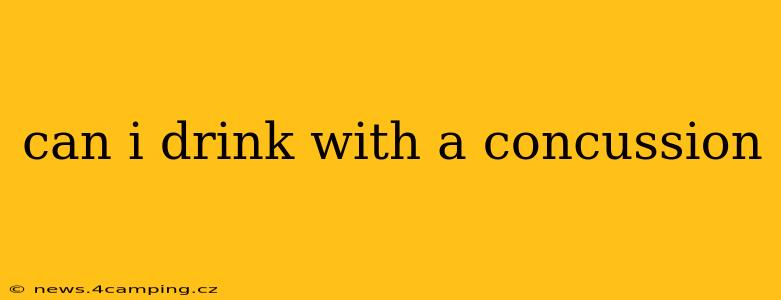A concussion, also known as a mild traumatic brain injury (mTBI), is a serious injury that requires careful management. One crucial aspect of recovery is avoiding alcohol. The short answer is: absolutely not. Drinking alcohol after a concussion can significantly hinder your recovery and potentially worsen your symptoms. Let's delve into the reasons why.
Why Alcohol is Harmful After a Concussion
Alcohol is a central nervous system depressant. This means it slows down brain activity. After a concussion, your brain is already vulnerable and working hard to heal. Adding alcohol to the mix further impairs brain function, potentially leading to:
- Prolonged recovery time: Alcohol can interfere with the brain's natural healing processes, extending the duration of your symptoms and recovery period.
- Increased risk of complications: Studies suggest that alcohol consumption after a concussion may increase the risk of more severe complications, such as post-concussion syndrome (PCS). PCS involves lasting symptoms like headaches, dizziness, memory problems, and cognitive difficulties.
- Exacerbated symptoms: Alcohol can worsen existing concussion symptoms, such as headaches, nausea, vomiting, dizziness, and confusion. It can also make sleep disturbances, which are common after a concussion, even worse.
- Increased risk of seizures: In rare cases, alcohol consumption after a head injury might increase the risk of seizures.
- Interaction with Medications: If you're taking prescribed medications for your concussion, alcohol can interact negatively, potentially reducing the effectiveness of the medication or causing adverse side effects.
What Happens to Your Brain After a Concussion?
Understanding what happens to your brain after a concussion helps clarify why alcohol is so detrimental. A concussion causes microscopic damage to brain cells and disrupts normal brain function. This disruption can lead to a range of symptoms, from mild to severe. The brain needs time and rest to repair itself. Alcohol interferes with this crucial healing process.
How Long Should I Avoid Alcohol After a Concussion?
There's no single definitive answer to this question. The duration of alcohol avoidance depends on the severity of your concussion and your individual recovery process. However, it's generally recommended to abstain from alcohol entirely until you are completely symptom-free and have received clearance from your doctor. This could take several weeks or even months.
What Should I Do Instead of Drinking Alcohol?
Focus on prioritizing your health and recovery. This includes:
- Getting plenty of rest: Adequate sleep is vital for brain repair.
- Maintaining a healthy diet: Nutritious food provides your body with the nutrients it needs to heal.
- Staying hydrated: Drinking plenty of water is essential for overall health and brain function.
- Avoiding strenuous activity: Give your brain time to recover from the injury.
- Following your doctor's instructions: Your doctor will provide specific recommendations for your care.
What are the symptoms of a concussion?
Symptoms of a concussion can vary greatly from person to person, and they can appear immediately after the injury or develop gradually over time. Common symptoms include headache, dizziness, nausea, vomiting, balance problems, confusion, memory problems, sensitivity to light or noise, and fatigue. More severe symptoms can include loss of consciousness, seizures, and persistent vomiting.
When should I seek medical attention for a concussion?
You should seek immediate medical attention if you experience any of the following after a head injury:
- Loss of consciousness
- Severe headache that worsens
- Seizures
- Vomiting
- Slurred speech
- Weakness or numbness in limbs
- Changes in vision or hearing
- Confusion or disorientation that lasts for an extended period.
Remember, your health is paramount. Avoid alcohol after a concussion to ensure a safe and effective recovery. Consult with your doctor or a healthcare professional for personalized advice and treatment. They can assess your specific situation and provide tailored guidance on your recovery journey.
